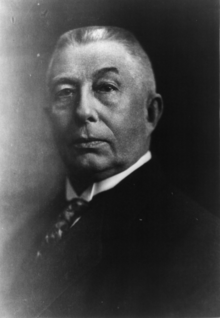Hendrikus Colijn
Hendrikus (Hendrik) Colijn (born June 22, 1869 in Burgerveen, municipality of Haarlemmermeer ; † September 18, 1944 in the Berghotel Gabelbach near Ilmenau ) was a Dutch military man , businessman and politician.
Life
Colijn was born in 1869 in a newly created polder area in North Holland . His parents, Antonie Colijn and Anna Verkuijl, had moved to the Haarlemmermeer polders from Heusden (Netherlands) and Altena as members of the Reformed Church for religious reasons . At the age of 16 he went to officer training at the military academy in Kampen , which he graduated in 1892 as a lieutenant . In 1893 he married Helena Groenenberg, and in the same year he was posted to the Netherlands Antilles . In 1894 he signed up for the so-called Lombok expedition for financial reasons , after which he served ten years in the colonial army and then six years in the colonial administration as assistant to the governor of Aceh .
After his return to the Netherlands in 1909 he was elected as a member of the Anti-Revolutionary Party in the Dutch parliament as a representative of the constituency of Sneek . Just two years later he became Minister of War . During this time he completely rebuilt the Dutch pattern system .
From 1914 to 1922, Hendrikus Colijn was chairman of the board of Bataafse Petroleum Maatschappij (BPM) , which was incorporated into the Royal Dutch Shell in 1925 . At the same time, at the end of the First World War in 1918, he acted as a mediator between the United Kingdom and the German Emperor Wilhelm II in order to end the war, which also led to Wilhelm II finding refuge in the Netherlands after his abdication . In 1920 he took over the leadership of the anti-revolutionary party (Calvinists) and in 1922 also the editor-in-chief of the party newspaper De Standaard , from 1925 to 1926 and from 1933 to 1939 he was five times Dutch Prime Minister . In 1939, however, his last cabinet only lasted for three days. From 1927 to 1929 he was the head of the Dutch delegation to the League of Nations in Geneva . One of his comrades in the League of Nations was his later Foreign Minister Andries Cornelis Dirk de Graeff , who was able to persuade the Netherlands to join it.
In 1929 he was given the honorary rank of Minister of State .
After Germany's invasion of the Netherlands in 1940, Colijns wrote an essay entitled On the Frontier of Two Worlds ( Op de grens van twee werelden ), in which he called for acceptance of the German leadership in Europe, but also stressed that he was "Calvinist for National Socialist lines of thought of any kind not to be had". This essay was published immediately after the royal family fled to England with Wilhelmina at the helm.
A little later he tried to organize a resistance against the German occupation. He was then arrested in June 1941 and taken to Berlin for questioning. In March 1942 he was released from prison, but was not allowed to return to the Netherlands, but was forced to go to Ilmenau in Thuringia , where he lived under house arrest at his own expense in the remote Berghotel Gabelbach , accompanied only by his wife. His mail was strictly censored and he was only rarely allowed to receive visitors (such as from his grandson). Apparently Heinrich Himmler wanted to use him as a possible mediator with the British, whereby Colijn would have resumed his old role from the time of the First World War. He spent his last years in Ilmenau with extensive studies before he died of a heart attack in September 1944.
Web links
- Detailed biography on www.inghist.nl (Dutch)
- Newspaper article about Hendrikus Colijn in the 20th century press kit of the ZBW - Leibniz Information Center for Economics .
| personal data | |
|---|---|
| SURNAME | Colijn, Hendrikus |
| ALTERNATIVE NAMES | Colijn, Hendrik |
| BRIEF DESCRIPTION | Dutch military, businessman and politician |
| DATE OF BIRTH | June 22, 1869 |
| PLACE OF BIRTH | Burgerveen , Haarlemmermeer municipality |
| DATE OF DEATH | September 18, 1944 |
| Place of death | Ilmenau |



